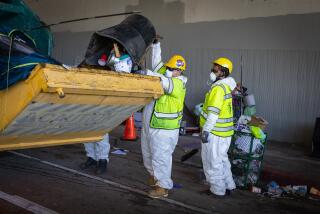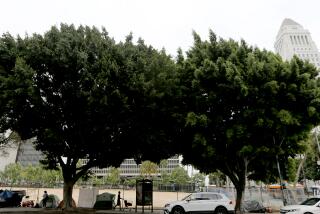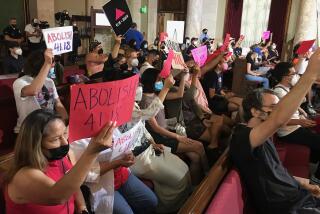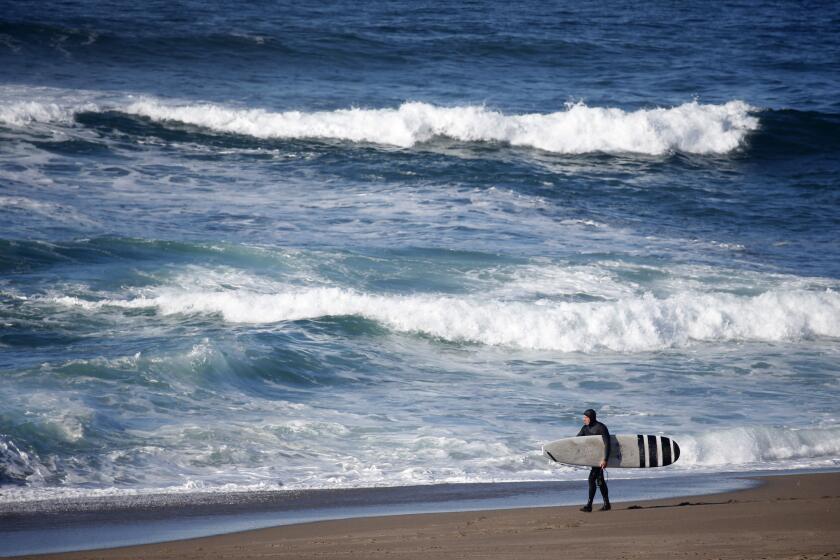ACLU Challenges Law Banning Gangs From San Fernando Park
The ACLU filed suit Tuesday to overturn a San Fernando city ordinance that bars gang members from a park where a mother and her three children were wounded in the cross-fire of a gang fight in July.
The challenge by the American Civil Liberties Union--alleging that the ordinance violates gang members’ right to free assembly--comes one day after Pomona adopted a similar measure and as the Los Angeles City Council considers a sweeping proposal to counter gang activity in all city parks, beaches and recreation centers.
The suit, filed in Los Angeles Superior Court, seeks a permanent injunction against enforcement of San Fernando’s ordinance, which threatens members of two local gangs with $250 fines if they enter Las Palmas Park. In bringing the action, ACLU officials also challenged the rationale for any such “quick-fix Band-Aid solution” to gang problems.
“The most ominous development,” the ACLU said, was a proposal that Los Angeles City Atty. James K. Hahn submitted this month to the City Council’s Public Safety Committee.
The Los Angeles measure would not categorically make parkland off-limits to groups such as the Bloods and Crips.
In a bid to stave off a legal challenge like the one targeting San Fernando’s measure, Hahn’s ordinance would allow gang members to use park and beach areas “to play football . . . or conduct a legitimate recreational activity,” a spokesman said. But it would be a crime for gang members to assemble there “with the specific intent to commit, promote, further or assist in any criminal conduct.”
The ACLU, however, said the Los Angeles measure would cause “abuses of the civil rights of people falsely branded as gang members,” calling it “the worst of all strategies . . . implying that the problem of gang violence in Southern California can somehow be resolved just by trying to keep it out of sight.”
In a 33-page report distributed at a news conference called to announce the lawsuit, the ACLU said the ban on gang members at Las Palmas Park merely shifted gang violence “to nearby neighborhoods.” Two shootings, it said, occurred within 100 yards of the park on Oct. 20, during a celebration of “its alleged liberation from gang elements.”
Saying they were not heedless of crime’s victims, as opponents have painted the organization, ACLU officials released their own recommendations for stemming gang violence in San Fernando. They included creation of a gang intervention program to encourage mediation between two warring Latino gangs and better lighting and a police substation in Las Palmas Park.
Impetus for the San Fernando ordinance came from a July 3 gang shootout, in which a mother and three children using the park were wounded by shotgun pellets. Adopted Sept. 16, the law instructed police to compile a list of gang members and give them written notice that they were banned from the park.
San Fernando Police Chief Dominick Rivetti defended the ordinance Tuesday, saying it had achieved its purpose of dispersing the Shakin’ Cats and SanFers gangs.
“I would much rather deal with a gang that is fragmented and meeting in someone’s home than have 40 of them in the park every night,” Rivetti said.
Several gang members confirmed that they were staying away from the park, except for occasional nighttime forays to paint graffiti in defiance of police.
“It isn’t fair that we can’t go there anymore,” said Martin Gonzalez, 22, who described himself as a member of the Shakin’ Cats. “They’re picking on us and we don’t do anything.”
ACLU officials agreed that the park “is less openly violent” now, but said gang activity “went nuts” in surrounding areas.
In addition, banning one group from using a park--even to play ball--is “against everything our Constitution stands for,” ACLU attorney Robert Malley said.
Despite the legal challenge, Los Angeles County Dist. Atty. Ira Reiner, whose office drafted the San Fernando ordinance, has encouraged other cities to copy it.
Monday night, the Pomona City Council voted 6 to 1 to bar two local gangs from two parks--Philadelphia and Cherryville--where gang activities generated nearly 700 calls to police over a 12-month period.
The one dissenting vote came from Councilman Tomas Ursua, who said he was worried that “heightened tensions and antagonisms” could result from harassment of innocent park users mistaken for gang members.
The ordinance proposed for Los Angeles declares that its parks and beaches “are in a state of crisis” because of gangs. In a letter to the Public Safety Committee, however, Hahn suggested that a complete ban on gang members, like the ones in San Fernando and Pomona, might not be legal.
Hahn called for modifications to the ordinance “to better enable it to withstand constitutional scrutiny,” specifically with the requirement that police show that gang members are in a park to promote “criminal conduct.” Ted Goldstein, a spokesman for the city attorney, said police would have to conduct an investigation to “reveal what the street gang was in the park or on the beach for.”
The ordinance will probably come before the committee next year, Goldstein said.
Staff writer Mike Ward contributed to this report.
More to Read
Start your day right
Sign up for Essential California for news, features and recommendations from the L.A. Times and beyond in your inbox six days a week.
You may occasionally receive promotional content from the Los Angeles Times.






